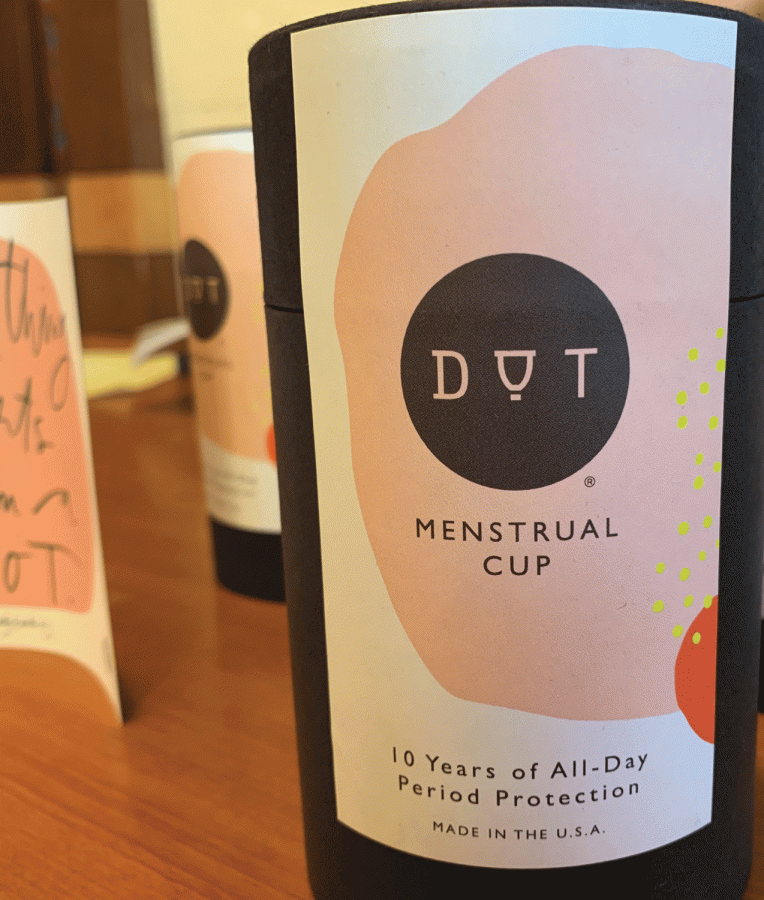SGA Sells Subsidized Menstrual Cups
The Student Government Association (SGA) began selling subsidized menstrual cups in the Coop on Friday, March 22 to promote a new sustainable initiative and advocacy program surrounding period destigmatization.
Cups are available to Colgate students for five dollars each. In comparison, Stanford University, one of the most progressive schools in this movement towards cheaper feminine hygiene products, subsidizes menstrual cups for students at a cost of nine dollars each, according to the Stanford Sexual Health Peer Resource Center.
“We wanted them to be just $5 so we can reach and impact a larger number of people,” senior and SGA President Jenny Lundt said.
Menstrual cups typically sell for about $40. They are a cost-savvy alternative to purchasing pads and tampons. According to the Huffington Post, the average menstruator spends $1,773.33 on tampons in their lifetime.
Tampons must be changed frequently and can only be used for six to eight hours at a time. In contrast, menstrual cups can be used for a longer time period and can last up to 15 years.
According to the Stanford Daily, menstrual cups are safer than other sanitary products. Inserted into the body like a tampon, menstrual cups are made of a flexible, medical-grade silicone material that collects, as opposed to absorbs, blood.
The Huffington Post also calculated that the average tampon user goes through 9,120 tampons in their lifetime, which is highly unsustainable.
“Think about putting 9,120 tampons and plastic and applicators, not to mention the ones that break in your bag and stuff, into the landfill. With all of the menstruators in the world… They are incredibly wasteful,” Lundt said. “So this was how we had the idea to subsidize them. If we can get some economic buy-in from students so we aren’t just handing them out willy nilly, people will feel invested to use and take care of them.”
Lundt worked with the SGA Sustainability Coordinator Christina Weiler ’21 to bring this vision to life.
“This project is important because it makes sustainable choices more accessible. We eliminated price as an obstacle, opening the door to sustainability for virtually every menstruator on campus,” Weiler said. “We know people often need that extra push to implement change in their lives. In this way, subsidies create a certain freedom for students to shift their preferences, and begin changing the world with the products they use every day.”
SGA purchased the menstrual cups online from Dot for All. SGA chose this company for its sustainable and socially conscious mission, Lundt said.
According to Dot For All’s website, for each Dot Menstrual Cup purchased, the company donates a menstrual cup to a woman or girl around the world to afford her the opportunity to pursue her education or job “without shame or interruption.”
Echoing the taboo associated with getting one’s period, Lundt cited that some students were hesitant to use the cups. She hopes to normalize their usage on Colgate’s campus. To do so, SGA is currently working to create a blog to collect people’s experiences with menstruation, to establish a more unified sense of this experience.
Period poverty and menstrual cup usage are topics at the fore- front of a global conversation. Freedom Cups, which provides menstrual cups to women in underdeveloped communities on a buy-one-get-one basis, and Mina Cups, which distributes to schools in African nations, are among the many companies working to serve developing communities who would otherwise be unable to afford sanitary products and potentially receive an education as a result. Additionally, “Period. End of Sentence.,” a documentary short that follows women who develop a sanitary product business in India, won an Academy Award in February.
The SGA has sold 17 of the 100 cups they purchased so far. They will be continuing to sell the menstrual cups throughout the month in the Coop.
Correction: An earlier version of this article contained inaccurate information about Progress Period, a student group that works to destigmatize menstruation on campus and has helped put menstrual product dispensers in 15 campus bathrooms. That information has been removed.
Contact Julia Klein at [email protected].







